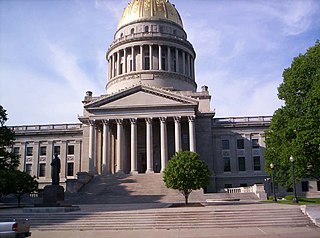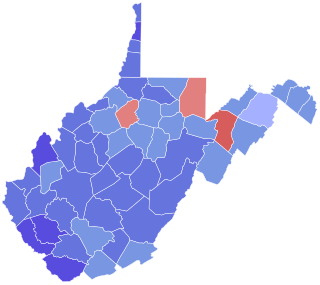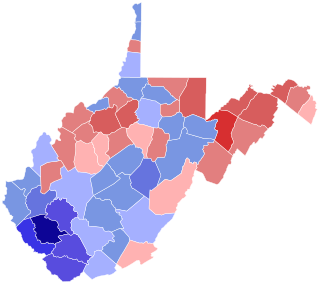
From the time of the Great Depression through the 1990s, the politics of West Virginia were largely dominated by the Democratic Party. In the 2000 presidential election, George W. Bush claimed a surprise victory over Al Gore, with 52% of the vote; he won West Virginia again in 2004, with 56% of the vote. West Virginia is now a heavily Republican state, with John McCain winning the state in 2008, Mitt Romney in 2012 and Donald Trump in 2016, 2020, and 2024.

The 2012 United States Senate election in West Virginia was held on November 6, 2012, to elect one of West Virginia's two members of the U.S. Senate for a six-year term. In a rematch of the 2010 special election, incumbent Democratic U.S. Senator Joe Manchin won re-election to a first full term against the Republican nominee, John Raese. Notably, Manchin outperformed Barack Obama in the concurrent presidential election by 25.06 percentage points in vote share, and by 50.86 percentage points on margin.

The 2011 West Virginia gubernatorial special election was a special election held on October 4, 2011, to fill the office of the West Virginia Governor, which became vacant upon the resignation of Joe Manchin, who resigned after he won a U.S. Senate special election. Lieutenant Governor and Senate President Earl Ray Tomblin, first in the line of succession to the governorship, subsequently became acting governor. On January 18, 2011, the West Virginia Supreme Court of Appeals ruled that a special election for the governorship must be held so a new governor can be in place by November 15, 2011, exactly one year after Manchin resigned. The primary election was held on May 14. Tomblin and Republican Bill Maloney won their respective primaries.

The 2012 West Virginia gubernatorial election was held on November 6, 2012, to elect the governor of West Virginia. Democratic incumbent Earl Ray Tomblin, who was elected governor in a special election in 2011, was elected to a full four-year term. The election was a rematch of the 2011 special election.
Margaret 'Peggy' Donaldson Smith is an American politician and a Democratic member of the West Virginia House of Delegates since January 12, 2009. Smith served four terms in the West Virginia Legislature representing Districts 38 and 46 from January 2009 until the present.
Patrick Glen Lane is an American politician and a Republican member of the West Virginia House of Delegates representing District 38 since January 12, 2013. Lane served consecutively from January 2005 until January 2013 in a District 32 seat, and was a candidate for West Virginia Senate in 2002.
Mark A. Hunt is an American politician who is currently serving as the West Virginia State Auditor since 2025. As a Republican, he served in the West Virginia Senate, representing the 8th district from 2022 to 2025. From 2012 to 2014, Hunt was a Democratic member of the West Virginia House of Delegates representing District 36 from 2012 to 2014. Hunt served consecutively from January 2009 until January 2013, and non-consecutively from January 1995 until January 2001 and from January 2005 until January 2007 in District 30 and District 31 seats. Hunt was a candidate for West Virginia Senate in 2000 and a candidate for the United States House of Representatives for West Virginia's 2nd congressional district in 2006. In 2024, Hunt was elected West Virginia State Auditor.
William David Hamilton is an American politician. He is a member of the West Virginia Senate from the 11th district. He was a member of the West Virginia House of Delegates representing District 45 from January 12, 2013 to December 1, 2018. Hamilton served consecutively from January 2003 until January 2013 in the District 39 seat.
Ronald Neal "Ron" Walters Sr. is an American politician and a Republican member of the West Virginia House of Delegates representing District 39 since January 12, 2013. Walters served consecutively from January 2001 until January 2013 and non-consecutively from January 1993 until January 1999 in a District 32 seat. Walters was a candidate for West Virginia Senate in 1998.
Craig Philip Blair is an American politician and a Republican member of the West Virginia Senate representing District 15 since January 12, 2013. Previously, Blair served in the West Virginia Legislature from January 2003 until January 2011 in the West Virginia House of Delegates in the District 52 seat. Blair is also the father of former WV Delegate Saira Blair.
William Ramsey Laird IV is an American politician and a former Democratic member of the West Virginia Senate representing District 10 from 2013 until 2017. Laird served consecutively from January 2009 until January 2013 in the District 11 seat, and served non-consecutively in the West Virginia Legislature from January 1997 until January 2001 in the West Virginia House of Delegates in a District 29 seat. Laird is the son of former United States Senator William Laird III.

The 1956 United States Senate special election in West Virginia took place on November 6, 1956, to elect a U.S. Senator to complete the unexpired term of Senator Harley M. Kilgore, who died on February 28. 1956. State Tax Commissioner William Laird III was appointed to fill this seat by Governor William C. Marland to fill the vacancy until a special election could be held and assumed office on March 13, 1956.

The 2022 Idaho House of Representatives elections took place on November 8, 2022. Primary elections were held on May 17, 2022. Idaho voters elected state representatives in all 70 seats of the House, electing two state representatives in each of the 35 Idaho state legislative districts. State representatives serve two-year terms in the Idaho House of Representatives.

The 2022 Massachusetts State Senate election was held on Tuesday, November 8, 2022, with the primary election having been held on Tuesday, September 6, 2022. Massachusetts voters selected all 40 members of the State Senate to serve two-year terms in the 2023–2024 Massachusetts legislature. The election coincided with United States national elections and Massachusetts state elections, including U.S. House, Governor, and Massachusetts House.

The 2000 West Virginia Senate election took place on Tuesday, November 7, 2000. State senate seats in West Virginia are staggered, with senators serving 4-year terms. 18 of the 34 state senate seats were up for election, with 17 regular elections and with SD 11 holding an additional special election for Randy Schoonover, who resigned on September 7, 1999. The election took place concurrently with the presidential, U.S. Senate, U.S. House, and gubernatorial elections. While Republican candidate for George W. Bush won the state in the presidential election, the Democratic Party won over 70% of the vote for state senate candidates and retained a supermajority in the state legislature's upper chamber.

The 2004 West Virginia Senate election took place on Tuesday, November 2, 2004, to elect members to the 77th and 78th Legislatures; held concurrently with the presidential, U.S. House, and gubernatorial elections. State senate seats in West Virginia are staggered, with senators serving 4-year terms. 17 of the 34 state senate seats were up for election. While Republican candidate for George W. Bush won the state in the presidential election by 13 points, the Democratic Party won a majority of the vote for state senate candidates. Republicans managed to flip 3 seats, chipping away at the Democrats' supermajority.

The 2006 West Virginia Senate election took place on Tuesday, November 7, 2006, to elect members to the 78th and 79th Legislature. 17 of the 34 state senate seats were up for election. State senate seats in West Virginia are staggered, with senators serving 4-year terms. The election took place concurrently with the U.S. House and U.S. Senate elections. The Democratic Party won over 60% of the vote for state senate candidates and picked up 2 seats held by Republicans, retaining their supermajority. While President George W. Bush won the state in the previous presidential election, Democrats did well across the country and the state in a year described as a blue wave.

The 2008 West Virginia Senate election took place on Tuesday, November 4, 2008, to elect members to the 79th and 80th Legislatures; held concurrently with the presidential, U.S. House, U.S. Senate, and gubernatorial elections. State senate seats in West Virginia are staggered, with senators serving 4-year terms. 17 of the 34 state senate seats were up for election. While Republican candidate for John McCain won the state in the presidential election by 13 points, the Democratic Party won over 60% of the vote for state senate and flipped 3 Republican seats, expanding the Democrats' supermajority.

The 2014 West Virginia Senate election took place on Tuesday, November 4, 2014, to elect members to the 82nd and 83rd Legislatures; held concurrently with the U.S. House, and U.S. Senate elections. State senate seats in West Virginia are staggered, with senators serving 4-year terms. 17 of the 34 state senate seats were up for election. The Republicans won in a landslide, flipping 8 Democratic seats and securing a majority in the chamber after the defection of Democratic senator Daniel Hall the day after the election.
















